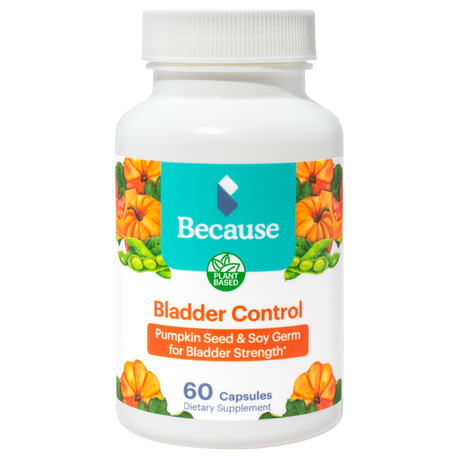Many men and women suffer from chronic or recurring UTIs which has led them to seek lifestyle modifications which may help prevent further occurrences. Examining the therapeutic properties of various herbs, we explore their potential to alleviate UTI symptoms and contribute to proactive urinary wellness. This informational journey aims to shed light on the practical applications of these herbal remedies, offering insights into incorporating natural solutions for improved urinary health. However, this blog is not intended to imply herbs can be used to treat urinary tract infections or fully prevent them.
Symptoms of Urinary Tract Infections
A urinary tract infection (UTI) is a common bacterial infection that can affect any part of the urinary system, including the bladder, urethra, ureters, and kidneys. UTIs occur in both men and women, but are more common among women. UTIs often present with a range of symptoms that can vary in severity. Common symptoms include:
- A persistent urge to urinate, also referred to as urge incontinence
- A burning sensation during urination
- Cloudy or strong-smelling urine
- Lower abdominal discomfort
- Frequent urination
- Urine that appears red, pink, or brown

The Best Natural Herbs to Support UTI Treatment
Herbs can play a supportive role in UTI treatment due to their inherent medicinal properties. Certain herbs exhibit antimicrobial and anti-inflammatory effects, which can help combat the bacteria responsible for urinary tract infections (UTIs) and alleviate associated symptoms. While herbs are not a substitute for prescribed antibiotics in severe cases, incorporating them as complementary measures may contribute to the overall effectiveness of UTI treatment, providing a natural and holistic approach to urinary health support.
As with any herbal supplements, individual responses can vary, and consultation with a healthcare provider is crucial to ensure safe and effective incorporation of any of these herbs into your UTI treatment strategies.
Dandelion
Dandelion, often considered a common weed, may offer support in UTI treatment through its diuretic properties. The plant's leaves and roots contain compounds that can stimulate increased urine production, potentially aiding in the elimination of bacteria from the urinary tract.
By promoting a higher volume of urine, dandelion may contribute to flushing out harmful microbes and toxins. Moreover, dandelion possesses anti-inflammatory and antioxidant attributes, which could assist in reducing inflammation and supporting the body's natural defense mechanisms during a UTI.
While research on dandelion specifically for UTI treatment is limited, its diuretic and anti-inflammatory properties suggest it may be a valuable herbal component in the broader spectrum of natural approaches to urinary health.
Uva Ursi
Uva Ursi, also known as bearberry or Arctostphylo Uva Ursi, has been explored for its potential in supporting UTI treatment due to its antimicrobial properties. The herb contains a compound called arbutin, which, when converted to hydroquinone, may exhibit antibacterial effects in the urinary tract. Uva Ursi is thought to inhibit the growth of bacteria such as Escherichia coli (E. coli), a common culprit in UTIs.
Additionally, the herb's astringent properties may help soothe and tone the urinary tract tissues. While Arctostphylo Uva Ursi shows promise as a natural remedy for UTI support, it is essential to use it under the guidance of a healthcare professional, as improper dosage or prolonged use may lead to side effects such as nausea or liver toxicity.
Marshmallow Root
Marshmallow root is recognized for its potential to provide support in UTI treatment owing to its soothing and anti-inflammatory properties. Rich in mucilage, a gel-like substance, marshmallow root forms a protective layer over the urinary tract lining, helping to ease irritation and inflammation associated with UTIs.
This mucilaginous quality may also contribute to increased urine flow, aiding in the expulsion of bacteria from the urinary system. Additionally, marshmallow root is believed to possess mild antimicrobial effects, potentially assisting in inhibiting the growth of bacteria.
While research on marshmallow root specifically for UTI treatment is limited, its historical use and anecdotal evidence suggest that it may offer a gentle and natural approach to alleviate discomfort and promote urinary health.
Goldenseal
Goldenseal is often considered as a potential supporter in UTI treatment due to its natural antimicrobial properties. The root of the goldenseal plant contains berberine, a compound known for its ability to combat a variety of bacteria, including those commonly associated with urinary tract infections (UTIs).
Berberine may inhibit bacterial growth and reduce inflammation in the urinary tract, potentially aiding in the alleviation of UTI symptoms. Goldenseal is also thought to possess immune-modulating effects, which could enhance the body's natural defense mechanisms during infection.
While scientific evidence on goldenseal's efficacy specifically for UTI treatment is limited, its historical use and potential therapeutic qualities make it an interesting consideration in natural approaches to urinary health.

The Best Herbs for UTI Prevention
In the pursuit of proactive urinary health, herbs stand out as powerful allies in the prevention of urinary tract infections (UTIs). This section delves into a comprehensive examination of herbs renowned for their preventive properties against UTIs. By harnessing the inherent qualities of these herbs, we aim to shed light on their potential to fortify the body's defenses, inhibit bacterial growth, and promote overall urinary wellness.
As with all supplements and vitamins, always consult with a doctor before starting a new regime. Not all supplements are equal and not everyone is a good candidate. Your healthcare provider can help you navigate which options are best for you.
Cranberry
Cranberry has long been recognized for its potential role in UTI prevention due to its high content of compounds called proanthocyanidins. These compounds are believed to possess anti-adhesive properties, which may inhibit the adherence of bacteria, particularly Escherichia coli (E. coli), to the walls of the urinary tract. By preventing bacterial attachment, cranberries may assist in reducing the risk of infection.
Additionally, cranberry's natural acidity could create an environment less favorable for the survival and proliferation of bacteria in the urinary tract. While scientific evidence on the efficacy of cranberry for UTI prevention is mixed, some studies suggest that incorporating cranberry products, such as cranberry juice, into one's routine may be a practical and accessible measure in the ongoing effort to support urinary health.
Horsetail
Horsetail, known for its diuretic properties and rich silica content, is considered by some as a potential contributor to UTI prevention. The diuretic effect of horsetail may promote increased urine production, aiding in the flushing out of bacteria from the urinary tract.
Additionally, the silica content in horsetail is thought to have mild antimicrobial properties, which could inhibit the growth of bacteria. While research on horsetail specifically for UTI prevention is limited, its historical use in traditional medicine and the potential benefits of increased urine flow and mild antimicrobial effects make it an interesting herb to explore in the context of urinary health.
Buchu
Buchu, derived from the Agathosma betulina plant native to South Africa, is considered by some as a potential supporter in UTI prevention. The leaves of the buchu plant contain essential oils, including diosphenol and limonene, which exhibit antimicrobial and anti-inflammatory properties. These qualities may contribute to inhibiting the growth of bacteria in the urinary tract and reducing inflammation.
Additionally, buchu is recognized for its diuretic effect, promoting increased urine flow and potentially assisting in flushing out bacteria from the urinary system. While research on buchu specifically for UTI prevention is limited, its historical use and the presence of bioactive compounds make it a subject of interest in natural approaches to supporting urinary health.

Holistic Approaches to UTI Defense
In the pursuit of comprehensive urinary tract health, adopting a holistic approach becomes pivotal, encompassing not only targeted herbal interventions but also mindful practices that fortify the body's defense against urinary tract infections (UTIs). Recognizing that a well-rounded defense goes beyond individual remedies, we explore how these holistic elements collectively contribute to the prevention of UTIs.
Take the Right Probiotic Daily
Choosing the right probiotic can be a proactive measure in preventing urinary tract infections (UTIs). Probiotics, often consisting of beneficial bacteria like lactobacilli and bifidobacteria, play a crucial role in maintaining the balance of the microbial community in the urinary tract. These friendly bacteria create an environment that inhibits the overgrowth of harmful pathogens, particularly Escherichia coli (E. coli), a common cause of UTIs.
By promoting a healthy balance of flora, probiotics contribute to the prevention of bacterial colonization in the urinary tract. Research suggests that incorporating specific strains of probiotics, such as Lactobacillus reuteri and Lactobacillus rhamnosus, may be particularly effective in reducing the risk of recurrent UTIs.
Hydrate Often
Staying adequately hydrated stands as a fundamental yet often overlooked aspect in the prevention of urinary tract infections (UTIs). Ample water intake plays a crucial role in promoting regular and sufficient urine flow, aiding in the flushing out of bacteria from the urinary system. Dilution of urine through hydration may also help reduce the concentration of potential pathogens, making it more difficult for bacteria to adhere to the urinary tract walls.
Moreover, maintaining proper hydration supports overall urinary function and ensures the continual elimination of waste products, minimizing the risk of bacterial buildup. As a simple and accessible preventive measure, prioritizing sufficient water intake serves as a cornerstone in fostering urinary wellness and reducing the likelihood of UTIs.
Pay Attention to Your Diet
Attentiveness to dietary choices plays a pivotal role in the prevention of urinary tract infections (UTIs). A diet rich in nutrients and balanced in essential components contributes to overall immune system strength, aiding the body in its natural defense against bacterial invaders.
On the other hand, limiting the intake of irritants like caffeine and spicy foods may contribute to maintaining the delicate balance of the urinary system. By adopting a thoughtful and health-conscious approach to diet, individuals can proactively reduce the risk of UTIs and support long-term urinary well-being.
Practice Proper Personal Hygiene
Maintaining meticulous personal hygiene practices stands as a crucial element in the prevention of urinary tract infections (UTIs). Simple habits, such as:
- Regular and thorough cleansing, particularly after using the bathroom
- Front-to-back wiping after bowel movements, particularly if you are a woman
- Choosing mild and unscented hygiene products
- Wearing breathable cotton underwear
- Avoiding tight-fitting clothing
- Avoid lubricants with flavoring agents and sugars
By integrating these hygiene practices into daily routines, individuals can significantly reduce the likelihood of UTIs and foster a healthy and resilient urinary tract.

Can Herbs Be Used to Cure a UTI at Home?
While herbs may offer support and relief in managing the symptoms of a urinary tract infection (UTI), they cannot be relied upon as a standalone cure at home. UTIs are caused by bacterial infections, commonly Escherichia coli (E. coli), and require antibiotic treatment prescribed by a healthcare professional. Antibiotics are specifically designed to target and eliminate the bacteria causing the infection.
While some herbs may possess antimicrobial and anti-inflammatory properties, the concentration and specificity of active compounds in herbs are insufficient to completely eradicate the bacterial infection.
Relying solely on herbal remedies at home may allow the infection to persist, potentially leading to complications and the risk of the infection spreading to the kidneys. It is crucial to seek prompt medical attention for a confirmed UTI diagnosis and follow the prescribed course of antibiotics for effective and complete resolution of the infection.

Red Flags and When to Call Your Doctor
Recognizing certain red flags during a urinary tract infection (UTI) is crucial, signaling the need for immediate medical attention. If symptoms intensify rapidly, including severe pain or discomfort during urination, lower abdominal pain, confusion, and persistent or worsening fever, it is imperative to consult a healthcare professional promptly. Blood in the urine, a sign of potential kidney involvement, should also be treated as a red flag.
Additionally, if symptoms persist or worsen despite home remedies or antibiotic treatment, seeking medical attention is essential to ensure a thorough evaluation and adjustment of the treatment plan if necessary. UTIs that ascend to the kidneys can lead to more severe complications such as kidney infection, bladder infection, and sepsis so it is critical not to ignore alarming symptoms and to consult a healthcare provider promptly for appropriate diagnosis and intervention.
Sources:
Hickling DR, Nitti VW. Management of recurrent urinary tract infections in healthy adult women. Rev Urol. 2013;15(2):41-8. PMID: 24082842; PMCID: PMC3784967.
Mayo Clinic. (2022, Sept. 4). Urinary tract infection (UTI). Mayo Clinic. https://www.mayoclinic.org/diseases-conditions/urinary-tract-infection/symptoms-causes/syc-20353447
Lotan Y, Daudon M, Bruyère F, Talaska G, Strippoli G, Johnson RJ, Tack I. Impact of fluid intake in the prevention of urinary system diseases: a brief review. Curr Opin Nephrol Hypertens. 2013 May;22 Suppl 1:S1-10. doi: 10.1097/MNH.0b013e328360a268. PMID: 23673384.









